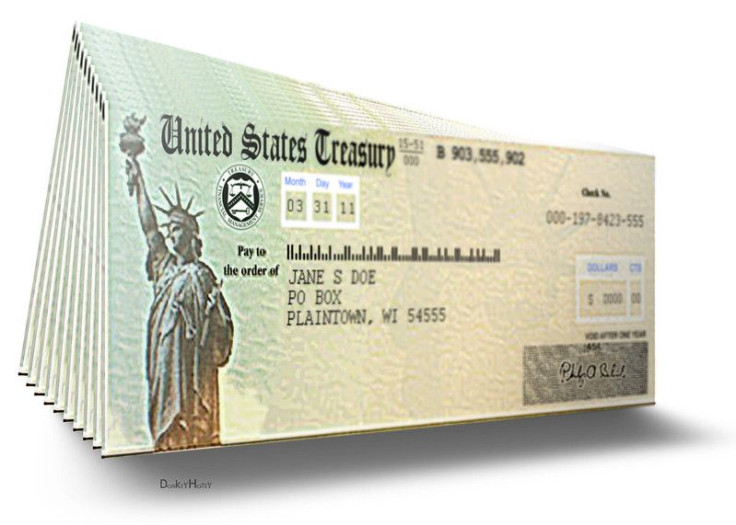Coronavirus Stimulus Checks: Will Direct Payments To Taxpayers Help Or Hurt The Economy?

KEY POINTS
- The Treasury is expected to start sending direct payments to consumers this week
- The vast majority of the funds are expected to go to necessities like food and rent, meaning the will do little to jump start the economy
- Those receiving the funds say they will be gone quickly
As U.S. taxpayers awaited the promised arrival of coronavirus aid checks this week, experts warned they would do little to help the economy near-term and could hurt the economy in the future as the budget deficit for the first six months of the year hit $741 billion, on course to top the predicted $1.1 trillion for fiscal 2020, and the U.S. debt climbed above $24 trillion.
The Treasury was expected to start sending out $1,200 checks to taxpayers who make less than $75,000 and lesser amounts to individuals making $75,000 to $99,000 -- sbut 80% of taxpayers -- as part of the $2.2 trillion coronavirus economic relief package adopted late last month. Families with children were to receive $500 per child.
But $1,200, or $2,400 for a couple earning less than $150,000, or $3,400 for a family of four, doesn’t go very far – especially for the 17 million Americans who lost their jobs between March 16 when social distancing guidelines were issued nationwide and April 4. That number is expected to swell further when last week’s figures come out on Thursday.
By Sunday morning, the U.S. was reporting more than 530,000 confirmed coronavirus infections -- nearly half the world's -- with deaths topping 20,600. Though President Trump keeps talking about reopening the economy, there was no indication the pandemic’s spread would stop any time soon though the rate of increase was believed slowing.
A Bankrate survey released last week indicated 31% of taxpayers don’t think the direct payments will last them a month and only 8% said they would spend the money on nonessential purchases. A recent FinanceBuzz survey indicated 62% of Americans don’t think the payments are large enough to help and 59% said they are worried about paying the rent or mortgage, even with the extra funds.
Wayne Winegarden, a senior fellow in business and economics at the Pacific Research Institute, told IBTimes in an email the direct payments to taxpayers will do little to mitigate the impact of the economic shutdown triggered by the coronavirus since the money likely will go to things like rent and food, and may be more damaging to the economy in the long-term because of the large economic costs the $2.2 trillion package is imposing.
"Yes, trillion-dollar deficits today mean tomorrow taxes will need to be raised, spending will need to be cut or interest payments will be permanently higher [assuming the debt will not be paid off and just continually revolved],” Winegarden warned. “In either scenario, this implies a cost on taxpayers in the future. The easiest way to envision this is to couch the cost as ‘a tax on future generations.’ The tax can be justified if it is an effective response to a once-in-a-century pandemic. [But] since the checks are not effective, they are just a burden."
“Even if consumers were willing to spend right now, policymakers have given guidance that social distancing is the best approach [to control spread of coronavirus]. How do you resume spending habits while avoiding public spaces?” asked Allen Sukholitsky, founder and chief macro strategist at Xallarap Advisory.
Robert Johnson, professor of finance at Heider College of Business at Creighton University, said Congress should have made the stipend larger and raised the limit on eligibility.
“For the vast majority of Americans, the stimulus checks will certainly be used for daily necessities rather than adding to savings or paying down debt,” he said. “The demographic receiving these checks is not well-positioned financially. … In fact, many of the recipients of these checks are looking for mortgage relief.”
Ted Rossman, industry analyst for CreditCards.com, say normally he’d be happy about “found money” to pay down debt, but now it’s more important to conserve cash.
“There's no substitute for money in the bank. … During the Great Recession, many card companies cut credit lines and sometimes even canceled cards without warning. As much as possible, seek to preserve cash flow flexibility to ride this out,” he said.
Rhea Thomas, economist at Wilmington Trust, said the direct payments combined with the more generous unemployment benefits provided under the CARES Act should help those most vulnerable to job losses and should help “bridge the gap to allow people to pay bills for rent, utilities and other obligations until firms impacted by the outbreak are able to get back on their feet and hire again.”
© Copyright IBTimes 2024. All rights reserved.





















